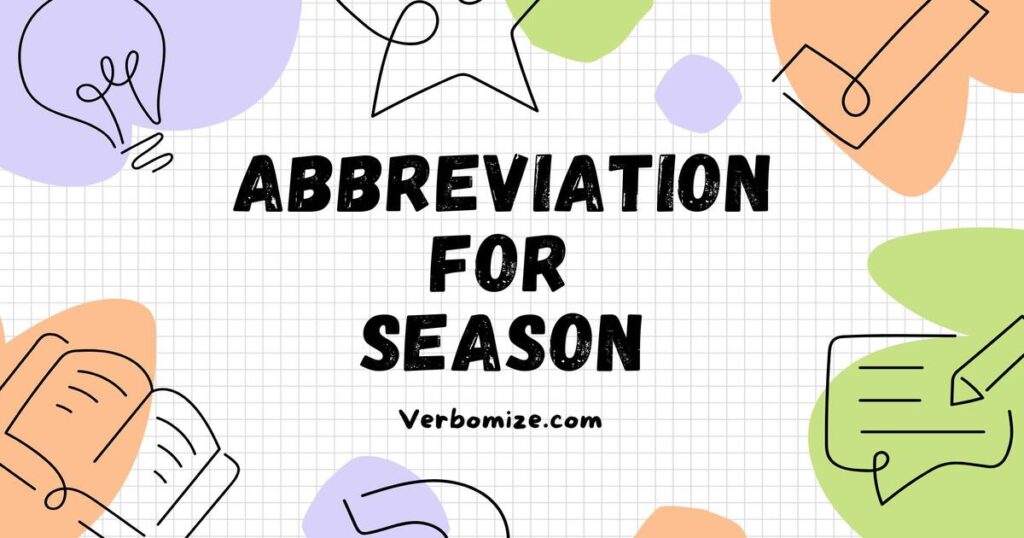The abbreviation for season is something you’ve probably come across, but might not have thought twice about. Whether you’re reading a weather forecast or scheduling events, these shorthand terms are everywhere. But do you know the meaning behind them and why they matter?
Understanding abbreviations for seasons can save you time and confusion in daily life, making your communication clearer and more efficient. Stick around as we break down the most common season abbreviations and how to use them correctly in various situations! You won’t want to miss it!
What is the Abbreviation for Season?
The abbreviation for season that has caught on is “szn”. It’s a simple, catchy way to condense the word “season” into just three letters. Unlike other abbreviations that are often formed by removing vowels or certain letters, “szn” takes the consonants “s,” “z,” and “n” to create a new shorthand form.
This abbreviation is widely used across different social media platforms, such as Twitter, Instagram, and TikTok. The casual, informal tone of “szn” fits perfectly in these digital spaces where brevity is essential due to character limits or the fast-paced nature of communication.
Understanding the Meaning of “Szn”
So, what does “szn” actually mean? It’s simply a shortened version of the word season, but it carries a cultural weight far beyond its basic definition. “Szn” can refer to various types of seasons, both literal and metaphorical. It can refer to:
- The traditional four seasons: The classic four seasons are winter, spring, summer, and fall.
- Sports seasons: The time frame during which a specific sport is actively played, like football szn or basketball szn.
- Pop culture seasons: Events or times that are closely associated with certain activities, such as pumpkin spice szn (fall season) or festival szn (a time when festivals are abundant).
In essence, “szn” is used to describe the unique period associated with particular activities, moods, or cultural events. It’s a reflection of our society’s affinity for brevity in communication and how certain words, especially in casual contexts, can be shortened to keep up with the fast pace of modern life.
Pronunciation of “Szn”
Now that we understand what “szn” stands for, let’s talk about how to pronounce it. While it might seem like a complex string of letters at first, the pronunciation is actually quite straightforward.
- How is “szn” pronounced?
The most common pronunciation of “szn” is “see-zuhn”. The “z” is pronounced like a “z” sound in “zebra,” and the “n” is soft and quick, just as it would be in the word “sun.”
For some people, particularly in regions with unique linguistic patterns, the pronunciation might vary slightly, but “see-zuhn” is the most universally accepted way to say it.
When to Use the Abbreviation for Season
“Szn” is not a word for every occasion—it has its place and time. It’s a great abbreviation for informal, casual communication, but it’s not suitable for formal or professional writing. Here’s when to use it and when to avoid it:
When to Use “Szn”
- Social Media Posts: On platforms like Instagram, Twitter, and TikTok, “szn” is a popular abbreviation that fits perfectly in captions, hashtags, and comments. For example:
- “It’s officially #summer szn! ☀️”
- “Football szn is back! 🏈”
- Texting and Casual Chats: In personal messages or informal communication, using “szn” adds to the laid-back tone of your conversation.
- “Excitedly waiting for pumpkin spice season to kick in! 🍂”
- “Are you ready for festival szn?”
When NOT to Use “Szn”
- Professional or Academic Writing: In more formal settings, such as reports, essays, or business communications, sticking to the full word “season” is always best. Using “szn” in these contexts could come off as unprofessional or overly casual.
- Official Documents: Avoid “szn” in contracts, official emails, or other documents where clarity and precision are crucial.
In summary, “szn” is best reserved for informal communication, particularly in social media and casual chats.
Why Is “Szn” So Popular?
The popularity of “szn” can be traced back to several cultural and social factors. Let’s break down why this abbreviation has become a staple in modern-day language.
Digital Communication and Character Limits
In the world of digital communication, where texting and tweeting often come with character limits, abbreviations have become necessary to keep messages concise. Twitter, for example, limits tweets to 280 characters, which means users must find clever ways to express ideas within a small space. This leads to the adoption of shorthand terms like “szn.”
Cultural Shorthand and Internet Trends
“Szn” is more than just a convenience for text—it’s part of the broader trend of cultural shorthand. This term encapsulates the essence of a season in a fun, quick way, and the internet loves that. As trends like “pumpkin spice szn” or “football szn” spread through social media, they’ve evolved into memes and jokes, further solidifying their popularity.
Brevity in Communication
In an era dominated by social media and the fast consumption of content, brevity is key. People prefer messages that are quick to digest, and abbreviations like “szn” help achieve that. The shorter, punchier form of the word “season” matches the rapid pace of digital conversations, where clarity often beats formality.
The Cultural Context of “Szn”
“Szn” is not just a linguistic phenomenon—it’s deeply intertwined with modern culture. Its rise coincides with a number of trends and behaviors unique to the 21st century.
- Social Media Influence: Platforms like Instagram, Twitter, and TikTok have encouraged the use of abbreviations to keep posts snappy and engaging. The term “szn” fits right into this culture.
- Seasonal and Themed Trends: The term has found a home in the world of seasonal trends. Think pumpkin spice szn, a term that gained traction with the fall craze surrounding pumpkin-flavored products, especially the iconic Pumpkin Spice Latte from Starbucks. These types of trends are amplified by pop culture, with influencers and brands creating content around seasonal tags like “sweater szn” or “summer szn.”
- Youth Culture: Much of the appeal of “szn” comes from its widespread use among younger generations. Millennials and Gen Z are the main groups responsible for popularizing this shorthand as part of their cultural lexicon.
How to Use “Szn” in Your Writing
If you’re looking to use “szn” effectively, here are some tips:
- Use it in Social Media Captions: Whether you’re celebrating football szn, festival szn, or winter szn, it’s a fun and engaging way to interact with followers.
- In Casual Conversations: Keep it light and informal when chatting with friends or texting family.
- Avoid Overuse: Just because it’s trendy doesn’t mean you should use it all the time. Overdoing it can make your writing sound forced or try-hard.
Example Sentences:
- “It’s summer szn! Time for beach days and barbecues! 🏖️”
- “Anyone else obsessed with football szn? 🏈”
- “Pumpkin spice szn is officially here! 🎃”
The Short Form for Season: “Szn” vs. “Seas”
While “szn” is by far the most common abbreviation for “season,” you may occasionally see other variations like “seas.” But in practice, “szn” has solidified its place as the dominant abbreviation. Here’s a quick comparison of how they measure up:
| Abbreviation | Common Usage | Cultural Significance |
|---|---|---|
| Szn | Most widely used | Tied to pop culture, memes, and youth language. |
| Seas | Less common | Seen occasionally but not as widespread as “szn.” |
“Szn” simply feels more natural and trendy, making it the go-to abbreviation for most users.
Acronym for Season: Is “Szn” an Acronym?
Technically, “szn” is an abbreviation, not an acronym. An acronym is a word formed from the initial letters of a phrase, like NASA or FBI. “Szn,” however, isn’t formed by taking the first letter of multiple words but rather by shortening a single word—season.
Synonyms for “Season”
While “szn” is a popular shorthand for season, there are several other words that can be used in place of “season,” depending on the context:
- Period: Refers to a specific amount of time, such as a season in sports or entertainment.
- Phase: Often used to describe a period of time or a particular stage in life or a process.
- Cycle: Can refer to a recurring period of time, like the cycle of the seasons.
Antonyms for “Season”
In contrast to the busy, event-filled periods that seasons often represent, there are some words that describe their opposite:
- Off-season: Refers to the time when certain activities or sports are not happening.
- Break: A pause or hiatus, often used in the context of work, school, or sports.
The History of the Abbreviation “Szn”
The history of “szn” can be traced back to the evolution of language in the digital age. As texting and social media became ubiquitous, abbreviations and shorthand became necessary to convey messages quickly and efficiently. The rise of memes and viral trends also contributed to the widespread use of “szn.” As with many digital slang terms, its usage spread organically through platforms like Twitter and Instagram, especially among younger people.
Final Thoughts on the Abbreviation for Season
“Szn” is a great example of how language evolves alongside technology and cultural trends. Its popularity is not just due to its convenience but also its cultural significance. It connects us to the digital world, helps us engage with trends, and allows us to communicate in a way that feels current and relevant.
Whether it’s the football szn, summer szn, or pumpkin spice szn, this abbreviation has found its place in both our digital lexicon and our daily conversations. Just remember, while “szn” is a fun and casual term, always use it appropriately based on context—keeping it informal and trendy in places like social media, while sticking to the full “season” in more formal settings.

Jone Smith is an experienced blogger and content creator behind Verbo Mize. With a passion for storytelling and insightful commentary, Jone brings a wealth of knowledge on diverse topics. His expertise in blogging, combined with a keen eye for detail, makes his work both informative and engaging, offering readers valuable perspectives on a wide range of subjects.







